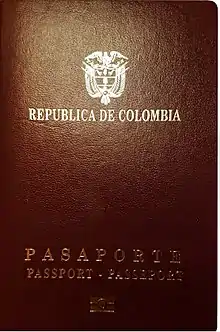Colombian nationality law
Colombian nationality is typically obtained by birth in Colombia when one of the parents is either a Colombian citizen or a Colombian legal resident, by birth abroad when at least one parent was born in Colombia, or by naturalization, as defined by Article 96 of the Constitution of Colombia and the Law 43-1993 as modified by Legislative Act 1 of 2002.[1]
| Colombian Citizenship Act | |
|---|---|
 | |
| Parliament of Colombia | |
| |
| Enacted by | Government of Colombia |
| Status: Current legislation | |
Nationality by birth
Colombia does not grant automatic birthright citizenship. To obtain Colombian citizenship at birth, a person must have at least one parent who is a citizen or legal resident of Colombia.[2]
A child born outside Colombia who has at least one Colombian parent can be registered as a Colombian national by birth, either upon returning to Colombia (for residents) or at a consulate abroad (for non-residents).[2]
Nationality by naturalization
A person who has lived in Colombia as a legal permanent resident for five years may apply for naturalization with the Ministry for Foreign Affairs.[3] There are exceptions to the usual residence requirements in some cases, including:
- one year of residence for citizens by birth of a Latin American or a Caribbean country;[4]
- two years' residence for citizens by birth of Spain;[4]
- two years' residence for a person married to a Colombian citizen or parent of child holding, or eligible for, Colombian citizenship;[4]
- five years' residence for foreigners who are not Latin American, Caribbean or Spanish citizens.[4]

Tests
Applicants for naturalization must also pass a test on Colombia's history, geography and constitution. A Spanish-language aptitude test is also required for people who are not native Spanish-speakers.[4]
Those who have a bachelor's degree from a Colombian university or are over 65 years old are exempt from the tests.[4]
Dual nationality
Colombian nationality law acknowledges that a Colombian by birth or by naturalization can also have other nationalities.[5]
Colombians who acquired Colombian nationality by birth cannot be deprived of it under any circumstances, so acquiring another nationality does not in itself result in the loss of Colombian nationality. A person who renounced their Colombian nationality may recover it later.
Nevertheless, certain government positions are barred for those with dual citizenship. For example, career diplomats may not hold dual citizenship as per Colombian law; an individual with dual citizenship may be appointed to a diplomatic position, but cannot acquire career rights.
Colombian citizenship
Colombian law differentiates between nationality and citizenship. Nationality is the attribute of the person in international law that describes their relationship to the State, whereas citizenship is given to those nationals (i.e. those that hold Colombian nationality) that have certain rights and responsibilities to the State. Article 98 of the Colombian constitution establishes that Colombian citizens are those nationals that are 18 years of age or older.[6]
Colombian citizens are entitled to vote in elections and exercise the public action of unconstitutionality.
Renunciation of citizenship
Colombian citizens can renounce their citizenship. The process of renunciation requires the citizen to appear at a Colombian embassy or consulate if the petitioner lives outside of Colombia, or at the Ministry for Foreign Affairs if the petitioner resides in Colombia. To start the process of renouncing Colombian citizenship, the petitioner must hold a citizenship from a different country.[7]
References
- Congreso de Colombia (25 January 2002). "Acto Legislativo 1 de 2002". Diario Oficial 44693 del 31 de enero de 2002 (in Spanish). City of Bogotá. Retrieved 20 December 2015.
- "citizenship". Ministry of Foreign Affairs. Retrieved 15 April 2017.
- "Ley 43 de 1993" (in Spanish). Congreso de Colombia. 1 February 1993. Retrieved 10 May 2016.
- "How to become a Colombian citizen". Ministry of Foreign Affairs. Retrieved 15 April 2017.
- Article 96. "Constitution of Colombia". Office of the Attorney General. Retrieved 15 April 2017.
- "Constitución Política de Colombia" (PDF) (in Spanish). Presidencia de Colombia. 1991. Retrieved 27 December 2010.
- "Renunciation of Colombian citizenship".